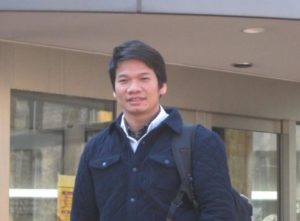Interview with Scholarship Recipient Kosinara Sok of Cambodia

The Japan ICU Foundation conducted a recent interview with Kosinara Sok, a recipient of the jointly funded Japan ICU Foundation/ICU/United Board Peace Studies Scholarship. He is a graduate student in Peace Studies at ICU.
Kosinara is in his first year of MA studies, which he enjoys a great deal. Originally from Phnom Penh, Cambodia, he is a public servant in the Ministry of Education, Youth and Sport, as well as a university lecturer at the department of international studies of the Royal University of Phnom Penh. The Japan ICU Foundation recently caught up with him on campus and asked him to share his thoughts and impressions on his experience at ICU thus far.
What is your impression of ICU?
ICU is certainly a lovely campus. I’m very happy to be able to study at ICU, because not only do I get to acquire theoretical knowledge from professors, but I can also make many international friends and colleagues here. I can enjoy many different activities, such as academic classes and social events as well. I was a bit nervous to study in Japan at first, because I didn’t know anyone or speak any Japanese. Now I really enjoy it, due to my many great professors, classmates, and friends here.
Do you live on campus?
Yes, I stay at Oak House, which is a very modern and comfortable environment. Part of the scholarship requirement is for me to live on campus, but I really enjoy the dorm life. It’s a very convenient place to live, because I am very close to the library, classrooms, and so on. I can also make many international friends, both Japanese and from many other countries.
How did you first find out about ICU?
Because I am a faculty member at the Royal University of Phnom Penh, we have a great partnership with the United Board for Christian Higher Education in Asia. I was able to apply through this connection, and also because of our new Department of International Studies at the Royal University needing greater Human Resources support. I was very happy to be able to get funding for my MA in Peace Studies here at ICU, which is one of my long-time dreams. I am extremely thankful to the United Board, ICU, and the Japan ICU Foundation for this wonderful opportunity.
What will you do after you complete your MA at ICU?
I’m going to keep building my professional career back at the Royal University in Cambodia, in order to help focus their new curriculum on Peace Studies, Democracy and Human Rights. I hope that my experience at ICU will allow me to share my knowledge with as many students as possible, in order for them to keep improving our Cambodian society for all members.
Do you see yourself pursuing further higher education in the future?
After graduating from ICU and then working a few more years in Cambodia, I would like to pursue a PhD if possible, either in Japan or in another country like Australia. As far as my long-term career, I would like to work with UN Agencies in Cambodia, particularly in youth development. It’s very important to help young people to understand the critical importance of Human Rights and ensuring the accountability of elected leaders.
What are some of the challenges that Cambodia faces now?
Concerning these challenges, there are many, such as problems with political elites who engage in land grabbing. There is also a lot of corruption due to lack of accountability and low pay for public servants. This causes an increase in corruption and a further lack of accountability, which makes young people in our society more and more cynical. This culture of impunity supports the power of political elites, and prevents good governance for all people.
What are some of your favorite classes here at ICU?
Most of them have been related to Human Rights, Human Security, Peace Studies, and so on. They are very relevant to social problems we face in Cambodia, so I am very happy to learn more of the theories here and build very practical skills as well for dealing with these issues.
Who is your academic advisor?
My advisor is Professor Christian Collet. I meet with him once a week, for very intensive discussion. He has been very helpful in assigning readings that explore my research on Democracy and Human Rights. I’m very happy to have such a great resource like him.
What do you like to do when you are not in class?
I normally go to the library to read books related to my academic research. On the other hand, I like to take it easy sometimes. For example, I like to relax and play soccer with several of my friends who also live here in the dormitories.
What do you like most about Japan?
There are so many things to like, but I would say that the people are so very friendly here! Both Tokyo and ICU are also great examples of post-conflict development and reconstruction after WWII. Things here are so modern and convenient all the time, and the food is delicious!
What would you like to say to the donors of the Japan ICU Foundation?
I would like to convey my deepest gratitude to the very generous donors, as well as the staff and Trustees of the Japan ICU Foundation in the United States. I really hope to visit them in person someday! Without them I would never have realized my dream to study and obtain my graduate degree in Peace Studies here in Japan.
I would also like to express my strongest commitment to my studies, to help Cambodians continue to develop their capacity for the Rule of Law, respect for Human Rights and Democracy. Not just nationally, but also regionally and globally, for peace in our world.



